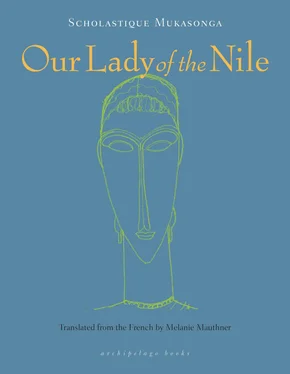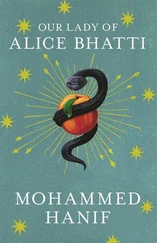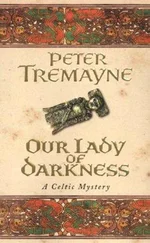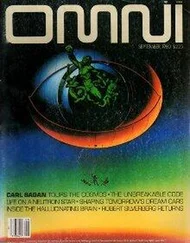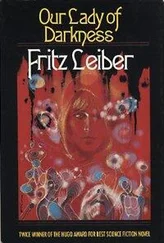“But the young lady can’t stay here all night. She’s a pupil, we must …”
“We’ll tell you once again, there’s no point arguing,” said the other guard, who stood up, revealing his towering frame to Father Herménégilde. “The kid’s cool, they don’t want to be disturbed.”
“But, really …”
“I told you there’s no point in arguing. The kid’s with her fiancé, it’s what Monsieur came for.”
The giant of a guard slowly came down the steps, and advanced menacingly toward Father Herménégilde.
“All right, all right,” said Father Herménégilde, retreating. “Please pay my respects to His Excellency and wish him a good night, I’ll see him tomorrow.”
Frida remained in the Bungalow with her fiancé until Sunday afternoon. When the convoy of Land Rovers moved off, Frida was seen on the top step of the Bungalow waving expansive good-byes until the cars disappeared around the first bend in the track. A small crowd of pupils in the garden witnessed the scene, held some distance away by Sister Gertrude’s threats and a brigade of servants, and when Frida pushed her way through her clustered schoolmates with affected nonchalance, she didn’t deign to answer any of the questions they hurled at her.
“Mother, Reverend Mother,” said Sister Bursar, as she entered Mother Superior’s study, “if you could see the Bungalow! What a mess! And the kitchen … And Monsignor’s bed …”
“Calm down, dear Sister, they won’t be coming back. I’ve negotiated with Monsieur Ambassador, made him see sense, and he’s recognized it will be difficult for him to come to the lycée every Saturday and Sunday. He has his diplomatic obligations, and I reminded him that the track gets bad in the rainy season, he might even get stuck. So he agreed, and this is what we decided: whenever it’s possible, an embassy car will come and collect Frida on Saturday, then return her on Sunday … or maybe on Monday … sometimes. Well, they are engaged after all, as Father Herménégilde says … and we must render unto Caesar …”
For several weeks, an embassy car drove up to fetch Frida each Saturday after midday refectory. The same car deposited her back at school late Sunday night or, more often, on Monday morning. Mother Superior and the monitors pretended not to hear the creaking gate in the middle of the night, and the professors not to notice when Frida suddenly burst into class and noisily took her seat to a murmur of disapproval from her schoolmates. But Frida eventually broke her disdainful silence: she couldn’t resist the desire to dazzle her schoolmates with the enthusiastic account of the inimitable life she led with her fiancé. In order to make peace with those girls she’d scorned for so long, and who would remain slyly hostile no matter what she did, Frida brought a whole basket of goodies back from the capital: doughnuts only Swahili mothers know how to make, and above all, the even more exotic brioches and rolls from the Greek baker, as well as sweets from Chez Christina, the shop for whites. There was always some Primus, even a bottle of wine sometimes, preferably Mateus. Practically the whole class managed to squash into Frida’s “bedroom,” even the class’s quota of two Tutsi was invited. When the bell rang for lights-out, the monitor, who had her share of the feast, didn’t dare interrupt the fiancée of His Excellency the Ambassador. Frida went over the inventory of her wardrobe at the Zairian Embassy again and again, employing words that didn’t fail to impress her audience: evening dress, cocktail dress, culottes, negligé, nightgown. Sometimes she brought one of these prestigious outfits with her, putting it on to elicit wonderment — sincere or feigned — in all the girls. Addressing Immaculée, the acknowledged specialist when it came to beauty products, she listed every skin lightener Ambassador Balimba had recommended to her: makeup remover, foundation, Oriental Blossom lotion, etc. He wanted the whitest fiancée.
“And jewelry?” they asked her anxiously.
Naturally, Monsieur l’Ambassadeur had given jewelry to his fiancée: an engagement ring boasting a huge diamond (in Zaire they walk on diamonds), gold bracelets, vintage ivory bracelets, necklaces of pearls and precious stones. But her fiancé forbade her to wear any outside the embassy. “It would only attract thieves, Kigali’s crawling with them! It’s too risky: a hand for a basic ring, an arm for a bracelet,” he explained. “As for those soldiers and policemen at roadblocks, you never know who you’re really dealing with.” When Frida wasn’t there, the jewelry was strictly locked away in the embassy’s enormous safe.
“And your dowry? What’s your dad negotiated for your dowry?”
“Don’t worry, we’re not talking goats or cows here, but money, lots of money! My father and my fiancé are going into business together to set up a transport company. Balimba’s putting in all the money, capital he calls it. They’ll buy trucks and tanker trucks to carry goods between Mombasa and Kigali, but they’ll go further than Kigali, as far as Bujumbura and Bukavu — my fiancé knows the Director of Customs. Ah, if you only you knew what kind of life I’m living with His Excellency Monsieur Ambassador of Zaire my fiancé. We go to all the bars, like the Hôtel des Milles Collines or the Hôtel des Diplomates. And at the French Ambassador’s, we eat corned beef that’s far tastier than what Sister Bursar gives us for the pilgrimage. And at the Belgian Ambassador’s, they serve shellfish from the sea, though I didn’t dare try it — it’s not fit food for a Rwandan after all … And we never drink Primus, but white folks’ beer, and when you uncork it — there’s no need for a bottle opener — it explodes like thunder and this foam spurts out like smoke from Nyiragongo.”
“You think my dad hasn’t heard of champagne?” Gloriosa cut in. “He’s always got some in his office for visitors, the important ones, he even let me have a taste.”
“And me,” Godelive said, “you think I haven’t seen mussels, I was born in Belgium but I was too young to eat them. My dad often talks about them; says Belgians eat nothing else, and when he goes to Brussels, my mother makes him promise he won’t touch them.”
Frida was oblivious to the troublemakers:
“If it’s a sunny afternoon, we don’t take a siesta, we get in the red car, the convertible sports car, and drive out of Kigali, speeding down narrow tracks and causing everyone to flee — women, children, and goats — and men on bicycles to zigzag about and drop their load of bananas and fall into the ditch. We seek out a quiet spot, which isn’t easy in Rwanda. One of those places reforested with eucalyptus. Or some rocks up on a ridge. We stop. I press a button. The roof opens. You know, those seats in the little red car are like a bed …”
During the heavy rains of November, there was a landslide that carried away all before it — banana trees, houses and their inhabitants — as well as cut off the road that led to the lycée for several weeks. That’s when Frida was seized with bouts of nausea, vomiting, and dizziness. She refused to touch the almost daily bulgur in the refectory, and would only eat the corned beef from the French Embassy. The fiancé had been alerted and managed, though nobody knew how, to send her a whole box of it. She wanted her best friends to taste some, but they were wary. Goretti discretely got hold of one of Frida’s empty cans and went to ask Monsieur Legrand, the French teacher with the guitar, what kind of food this might be. Monsieur Legrand explained that it came from a great white bird that was force-fed until it grew ill. Then people ate its illness. All the girls found that disgusting. Only Immaculée, Gloriosa, Modesta, and Godelive agreed to try some, at Frida’s insistence. Their verdict: it was rather soft, and looked like earth, or rather, Goretti said, like the grass that fills a cow’s belly and which the Batwa crave after a cow is killed. At any rate, it was real white food, and when it came to white food, they much preferred Kraft cheese and Sister Bursar’s deep red corned beef.
Читать дальше
